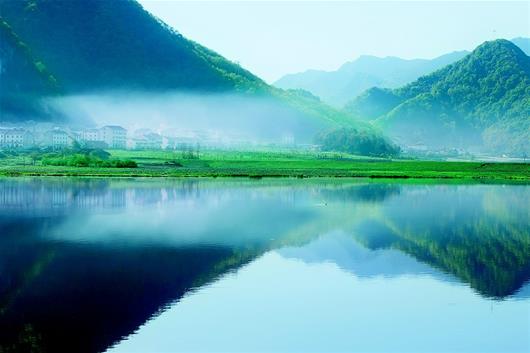Soil Erosion Becomes a Thing of the Past
Updated:2022-11-15 Source:Shennongjia National Park
 The misty Dajiuhu Wetland in Shennongjia
The misty Dajiuhu Wetland in ShennongjiaAfter an autumn shower, the forest in Shennongjia is tranquil and deep.
Yang Minghua, a 47-year-old B&B boss in Qingtianpao Village of Muyu Town, is chatting about the scenery with the visitors who are dinning in his restaurant. When they talk about the changes taking place in the village in recent years, he feels he takes great comfort from these changes.
If people want to go to Shennongding, the highest peak in Shennongjia, and Dajiuhu, an alpine wetland, Qingtianpao Village is on the only route. The scenery here is stunning, especially on a rainy day: it looks like a fairyland with misty valley and murmuring stream. “In the past, the people here all disliked rainy days. Who would imagine that it has become a special view now...” Yang Minghua became emotional and his train of thoughts got back to 30 years ago.
At that time, this village had more mountain areas than arable lands. To make a living, the villagers could only fell trees or go hunting or reclaim land from destroying woods.
The cultivated lands were generally hillside fields. Because the water and fertilizer would get lost, there was always a bad harvest. When there was heavy rain, the silt would flow about and seriously damage the crops. The more land people reclaimed, the worse the soil erosion got, and this, in turn, aggravated the havoc brought by natural disaster and the deterioration of the ecological environment.
In summer, there were often violent downpours lasting for a long while. The mighty torrents formed from eroded wasteland surged all over the area, as a result, the slopes, river course and roads were destroyed.
In 1982, Shennongjia Nature Reserve was established. It stipulates that nobody is allowed to fell trees or hunt animals or gather medicinal herbs or mine minerals; in case "uninvited guests" like wild boar and black bear may appear, which force people to make way for them and protect them. "Felling trees is not allowed, the economic benefits of planting crops are poor, while wild animals may come to damage the crops in the field," Yang Minghua said. "The villagers had no choice but to change their lifestyle and make a living outside the mountain." Thus, the young people in the village became migrant workers in cities, and those staying at home would seize opportunities to work as a casual laborer in the vicinity as well. Under such a situation, the phenomenon of soil erosion was just like before.
In 2000, a comprehensive ban for logging was imposed in Shennongjia, and the policies of ecological migration and turning marginal farmland to forests were put in place. The government guided the villagers to withdraw from the cultivated land on slopes and plant cash trees and landscape trees instead, and it also paid the land transfer fee and management fee to the villagers. This practice is very effective since it retained the soil, greened the mountains and helped the villagers to make money.
Qingtianpao Village has a tradition of planting tea trees, and the villagers are more inclined to plant tea trees after turning marginal farmland to forests, and the local tea is quite popular among visitors as well, according to Yang Minghua. In 2015, he took out a loan of 300,000 yuan from the bank to transform his own farmhouse into a farm stay. He recouped his investment and repaid the loan in only two years. Nowadays, more than 90% of the villagers in Qingtianpao Village have come back to their hometown to run farm stays or B&B or sell local specialties. Stretches of green tea garden become unique scenery in the locality. (By Wang Tong, Wen Jie and Yao Fei) Copyright Shennongjia National Park
Address:36 Chulin Road, Muyu Town, Shennongjia Forestry District, Hubei Province 鄂ICP备18005077号-3
Address:36 Chulin Road, Muyu Town, Shennongjia Forestry District, Hubei Province 鄂ICP备18005077号-3
Email:2673990569@qq.com
Phone:0719-3453368
Phone:0719-3453368


TOP

